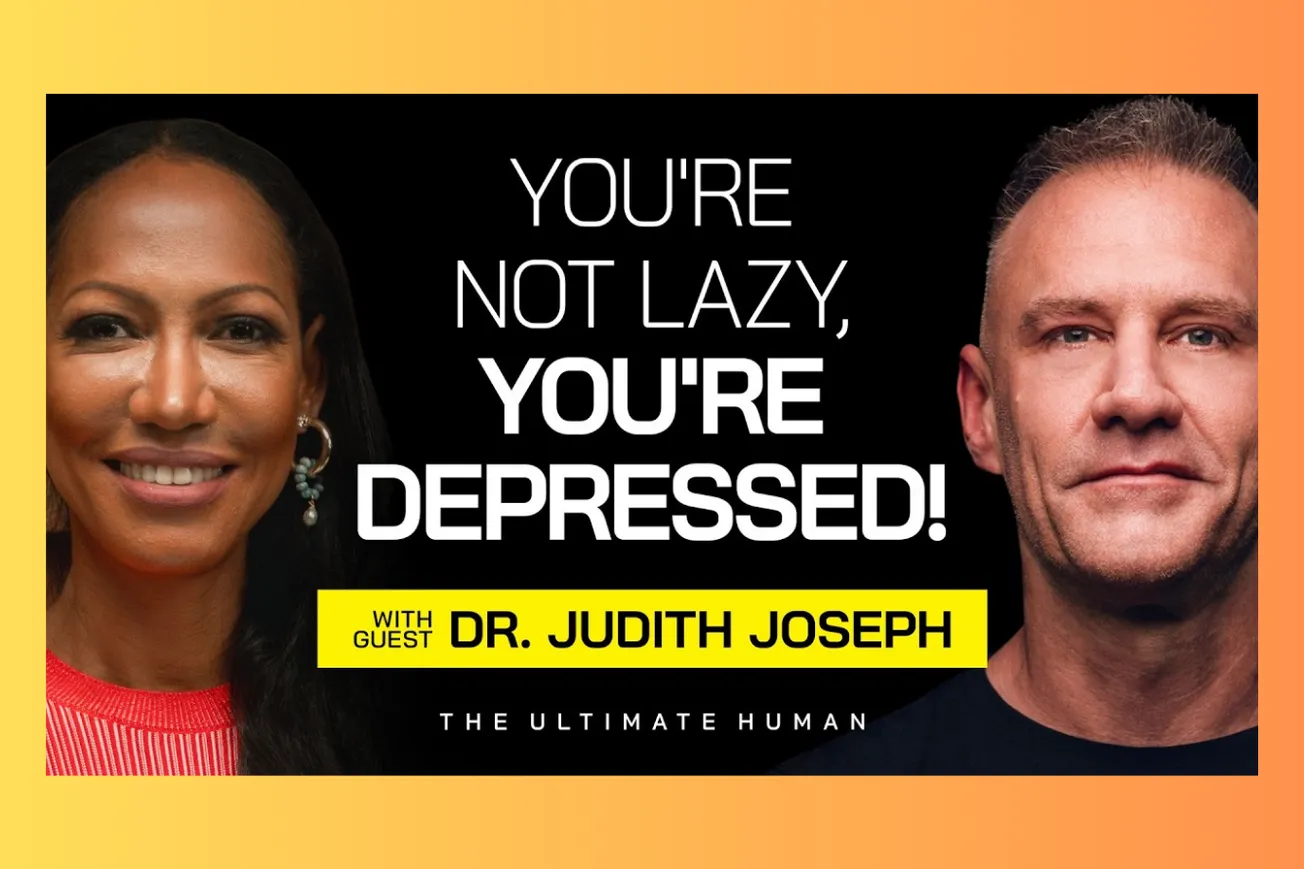Table of Contents
A pioneering psychiatrist reveals the hidden pandemic of anhedonia - the loss of joy in daily life - and introduces a revolutionary five-step methodology to reclaim happiness through understanding the science of your unique mental health blueprint.
Key Takeaways
- Anhedonia, the inability to feel joy in activities that once brought pleasure, represents a widespread but unrecognized mental health crisis
- High functioning depression differs from burnout because removing external stressors doesn't resolve the underlying restlessness and emptiness
- The bio-psycho-social model provides a personalized fingerprint for understanding your unique mental health risks and solutions
- The Five V's methodology (Validation, Venting, Values, Vitals, Vision) offers a systematic approach to rebuilding joy and emotional wellness
- Nutritional deficiencies, particularly B vitamins and vitamin D, significantly impact mood and can be addressed before medication
- Trauma doesn't require dramatic events - scarcity mindset, attachment styles, and unprocessed experiences create lasting mental health impacts
- Women face unique challenges with 82% of autoimmune conditions and twice the rate of depression due to caregiver syndrome
- Planning joy requires intentional calendar scheduling, not waiting for happiness to occur naturally
- Movement and exercise can be more effective than medication for depression, with behavior change leading to emotional and cognitive shifts
The Hidden Pandemic: Understanding Anhedonia
Dr. Judith Joseph introduces a concept that most people haven't heard of but millions are experiencing: anhedonia. This medical term describes the inability to feel joy or pleasure in activities that once brought happiness, creating a widespread epidemic of emotional mediocrity that people have accepted as normal.
- Anhedonia literally means "meh" or "blah" - the feeling of operating at a consistent 5 out of 10 emotionally, never reaching the higher levels of joy, passion, or elation that human beings are designed to experience
- People justify this emotional flatness by attributing it to aging, job stress, parenting responsibilities, or life circumstances, but it represents a dangerous acceptance of mediocrity that prevents individuals from thriving
- Unlike severe depression which motivates people to seek help, anhedonia's subtle nature allows people to function while missing out on life's most meaningful experiences
- The condition manifests as going through the motions of life - even on dream vacations with loved ones - without being able to fully connect with or feel the joy of these experiences
- Dr. Joseph emphasizes that humans are built with DNA for joy and are meant to experience the full spectrum of upper-tier emotions including passion, elation, arousal, and deep satisfaction on a regular basis
Joy vs. Happiness: The Critical Distinction
Understanding the difference between happiness and joy becomes crucial for addressing anhedonia and building a fulfilling emotional life. Dr. Joseph's research reveals that most people confuse these concepts, leading to frustration and continued emotional emptiness.
- Happiness represents an idea or future state - "I'll be happy when I pay off my loans, find the perfect partner, or get that promotion" - but science shows that achieving these goals doesn't actually produce lasting happiness
- Joy, in contrast, is an immediate experience available in the present moment - savoring delicious food when hungry, feeling refreshed after needed rest, or connecting with loved ones when lonely
- The research lab measures happiness through accumulated "points of joy" - specific moments of positive experience that can be tracked and intentionally created
- Joy represents our birthright as human beings, observed even in impoverished children playing in the streets who demonstrate natural happiness despite challenging circumstances
- The key insight is that while some people may never achieve their happiness goals, everyone possesses the biological capacity to access joy daily through conscious awareness and intentional practice
The Bio-Psycho-Social Model: Your Mental Health Fingerprint
Dr. Joseph democratizes a tool typically reserved for medical professionals, arguing that everyone should understand their unique bio-psycho-social profile to address mental health challenges effectively. This model provides a personalized approach to understanding why traditional interventions may fail.
- Biological factors include hormone imbalances, thyroid dysfunction, vitamin deficiencies, and genetic predispositions that affect mood regulation - requiring comprehensive testing beyond standard panels
- Psychological factors encompass past traumas, attachment styles, core beliefs, and coping mechanisms that shape emotional responses and behavioral patterns
- Social factors involve environmental influences including relationships, work stress, substance use, inflammatory foods, and lifestyle habits that impact mental health
- The model explains why generic approaches to mental health often fail - like using the same key for different locks - because each person's combination of factors requires individualized solutions
- Understanding your specific bio-psycho-social profile reveals where you're losing "points of joy" and provides targeted areas for intervention and improvement
High Functioning Depression: The Masked Struggle
Dr. Joseph's groundbreaking research on high functioning depression reveals a condition that affects successful, productive individuals who appear to have their lives together while struggling with internal emptiness and restlessness.
- High functioning depression differs from burnout because removing external stressors (like changing jobs) doesn't resolve the underlying issues - people continue staying busy, taking on others' problems, and feeling empty when not occupied
- The condition correlates strongly with unresolved trauma, creating a constant fight-or-flight state where individuals use busyness and productivity as avoidance mechanisms
- Unlike traditional depression presentations, these individuals receive praise and rewards for their productivity, making it difficult to recognize the underlying dysfunction
- The pathologically productive mask hides deep feelings of unworthiness, restlessness when still, and an inability to sit with their own thoughts without distraction
- Dr. Joseph's peer-reviewed research identified trauma as a key factor, with busy behavior serving as a form of avoidance that prevents processing difficult emotions
The Five V's: A Systematic Approach to Rebuilding Joy
Dr. Joseph's methodology provides a practical framework for addressing anhedonia and building emotional wellness through five sequential but interconnected practices.
Validation: Acknowledging Your Emotional Reality
The first V addresses the fundamental need to recognize and accept emotional states rather than suppressing or ignoring them.
- Affect labeling - simply naming emotions - serves as a therapeutic intervention that reduces stress and confusion
- Many people struggling with anhedonia have trained themselves to push down emotions, creating uncertainty that generates additional stress
- Basic validation includes acknowledging physical needs (hunger, fatigue, bathroom breaks) that busy individuals often ignore
- Blood test results can provide external validation that symptoms have biological causes, reducing self-blame and shame
- Trauma assessments help individuals recognize that their struggles stem from real experiences rather than personal failings
Venting: Healthy Emotional Expression
The second V focuses on appropriate ways to express emotions rather than allowing them to build up and explode inappropriately.
- Healthy venting requires asking for emotional consent and choosing appropriate recipients rather than trauma dumping on anyone available
- Expression doesn't have to be verbal - journaling, art, music, prayer, and physical movement all serve as venting mechanisms
- Dr. Joseph uses a vault in her office where patients can speak unprocessed thoughts aloud to themselves, demonstrating the power of acknowledgment
- Self-venting before confronting others helps prevent reactive behaviors that create guilt and shame
- The key is intentional expression that releases emotional pressure without creating additional problems
Values: Reconnecting with Purpose and Meaning
The third V helps individuals rediscover what truly matters to them beyond external achievements and social expectations.
- Values get lost in the busyness of life, with people forgetting activities and principles that once brought meaning and purpose
- Dr. Joseph uses narrative therapy to help patients identify times when they felt "full and fed" spiritually, then gradually reintroduces those elements
- The "priceless versus price tags" concept helps distinguish between authentic values and superficial achievements
- Many successful individuals realize they've been chasing accolades and external validation while neglecting relationships and experiences that truly matter
- Reconnecting with values requires starting small and building gradually, as anhedonia makes it difficult to immediately recapture lost passions
Vitals: Optimizing Physical and Mental Health
The fourth V addresses the biological foundations of emotional wellness through comprehensive health optimization.
- Traditional blood work only screens for disease, while functional medicine testing reveals nutritional deficiencies and imbalances that affect mood
- Sleep represents the most critical factor for mental health, with every mental health condition involving sleep disruption
- Nutritional psychiatry demonstrates that brain foods can significantly impact mood and cognitive function
- Dr. Joseph includes three non-traditional vitals: relationship with technology, relationship quality, and work-life balance
- Physical movement, even simple activities like making the bed, can trigger positive emotional and cognitive changes
Vision: Planning Joy and Celebrating Progress
The fifth V focuses on intentionally creating future joy and acknowledging progress rather than waiting for happiness to occur naturally.
- Planning joy requires literally scheduling pleasurable activities on calendars, as busy individuals won't naturally prioritize these experiences
- Celebrating small wins (like getting children to school on time) builds momentum and self-worth
- The practice involves both future planning and present-moment appreciation of achievements
- Without intentional joy planning, individuals remain stuck in cycles of productivity without emotional fulfillment
- Vision work helps create hope and forward momentum while acknowledging progress already made
The Trauma Connection: Redefining Traumatic Experiences
Dr. Joseph's research reveals that trauma's impact on mental health extends far beyond dramatic events, encompassing subtle but significant experiences that shape worldview and emotional responses.
- Scarcity trauma affects individuals from impoverished backgrounds who remain in fight-or-flight mode despite achieving financial success
- Attachment trauma creates unhealthy relationship patterns that drain emotional energy and prevent authentic connection
- Small "t" traumas include divorce, bankruptcy, exclusion, and other painful experiences that may seem manageable but create lasting impacts
- Trauma responses often involve pushing down memories as protection, causing issues to emerge in other areas like physical health, substance use, or compulsive behaviors
- The body's natural response to unprocessed trauma includes staying busy, doom scrolling, excessive shopping, and other avoidance behaviors that prevent healing
Women's Mental Health: Unique Challenges and Solutions
Dr. Joseph addresses the specific mental health challenges facing women, including higher rates of depression, anxiety, and autoimmune conditions linked to caregiving responsibilities and societal expectations.
- Women represent 82% of autoimmune conditions and experience twice the rate of depression and anxiety compared to men
- Caregiver syndrome involves prioritizing others' needs while neglecting self-care, leading to guilt about engaging in self-nurturing activities
- The bio-psycho-social model reveals how hormonal fluctuations, trauma history, and social pressures create unique vulnerabilities for women
- Dr. Joseph's research shows high correlation between caregiving responsibilities and anhedonia, as women lose connection to their own needs and desires
- The concept of joy as a birthright helps women reframe self-care as necessary rather than selfish, providing permission to prioritize their own wellbeing
Nutritional Psychiatry: The Food-Mood Connection
The emerging field of nutritional psychiatry demonstrates that dietary choices significantly impact mental health, offering intervention opportunities before medication becomes necessary.
- Busy individuals with high functioning depression often eat processed, convenient foods that lack essential nutrients for brain function
- Vitamin deficiencies, particularly B vitamins and vitamin D, directly contribute to mood disorders and can be addressed through targeted supplementation
- Inflammatory foods create brain inflammation that makes it difficult to experience joy and positive emotions
- When stressed, people make poor food choices that perpetuate the cycle of poor mental health and continued stress
- Brain foods supported by peer-reviewed research can improve mood in controlled studies, though they require effort and support to implement consistently
The Movement-Mood Connection
Physical activity represents one of the most underutilized interventions for mental health, with research showing exercise can be more effective than medication for depression.
- The therapeutic approach has shifted from "thoughts lead to feelings lead to behavior" to "behavior leads to feelings leads to thoughts"
- Even simple movements like making the bed daily can serve as small wins that build momentum and self-worth
- Walking represents the most underrated exercise for mental health, providing accessible movement that supports emotional wellbeing
- Dancing and rhythmic movement help right and left brain communication, creating natural healing responses
- Body morphology changes from exercise improve self-image and confidence, creating positive feedback loops for mental health
Practical Implementation: From Knowledge to Action
Dr. Joseph emphasizes that understanding mental health science without action leads to frustration and continued suffering. Her approach provides concrete steps for implementation.
- Focus on one or two V's at a time rather than attempting to address all areas simultaneously
- Start with small, manageable changes that build momentum rather than overwhelming interventions
- Use the bio-psycho-social model to identify your specific areas of vulnerability and strength
- Track "points of joy" daily to measure progress in concrete terms rather than abstract happiness goals
- Seek appropriate support for trauma processing, nutritional optimization, and lifestyle changes as needed
The Science of Happiness: Measurable Progress
Dr. Joseph's research approach treats happiness as a measurable phenomenon rather than an abstract concept, providing hope for individuals struggling with anhedonia.
- Happiness measurement focuses on accumulated positive experiences rather than achieving ideal states
- Daily opportunities exist to earn "points of joy" through basic self-care, connection, and conscious appreciation
- The approach removes pressure to achieve perfect happiness while providing concrete ways to improve emotional wellbeing
- Science-based interventions offer hope that change is possible even for individuals who have struggled with depression for years
- The methodology provides structure for progress tracking and adjustment as individuals develop their unique approaches to mental wellness
Dr. Joseph's work represents a paradigm shift in mental health care, moving from disease-focused treatment to joy-focused prevention and enhancement. Her approach acknowledges that mental health exists on a spectrum where most people can achieve significantly greater wellbeing through understanding their unique bio-psycho-social profile and implementing targeted interventions.
The ultimate message is one of hope: humans are designed for joy, and with proper understanding and intentional practice, individuals can reclaim their emotional birthright and build lives of meaning, connection, and fulfillment. The Five V's methodology provides a practical roadmap for this transformation, making mental health improvement accessible to anyone willing to understand the science of their happiness and take consistent action toward change.





